Google AirTags: why the incoming Apple rivals could take over the world
Is Android about to take the AirTag concept to a whole new scale?
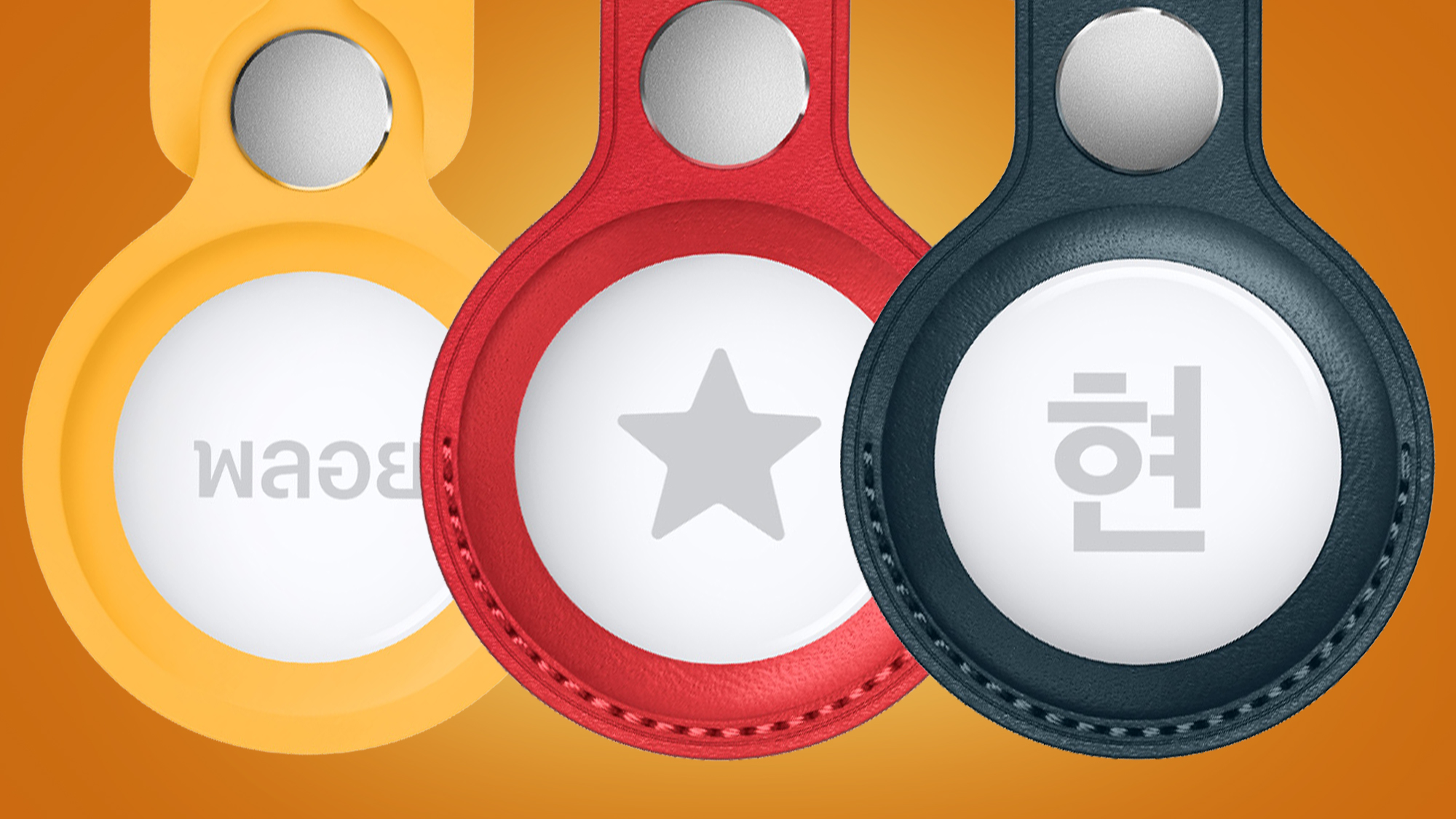
We've been hearing about a Google rival to the Apple AirTag for a long time now, but there are signs that these Google AirTags could be launching soon.
Or at least, the Android Find My Device network which would power any Google tracker seems set to roll out before long, with Google having now announced this service.
Once this service does launch, it only makes sense for Google to offer its own Bluetooth tracker to go along with this powerful network – which could leverage the billions of Android devices in the world to help you locate lost possessions. So there's a good chance we'll see this tracker sometime in 2024, especially as Google is rumored to be working on it.
Google's rumored AirTag rival – apparently codenamed Grogu, in a nod to fans of The Mandalorian – might actually launch as the Nest Locator Tag, going by a leak, and whatever it's called, it means Android users could soon have a high-profile alternative to the likes of the Tile Pro and Samsung Galaxy SmartTag2, along with a global object-finding network.
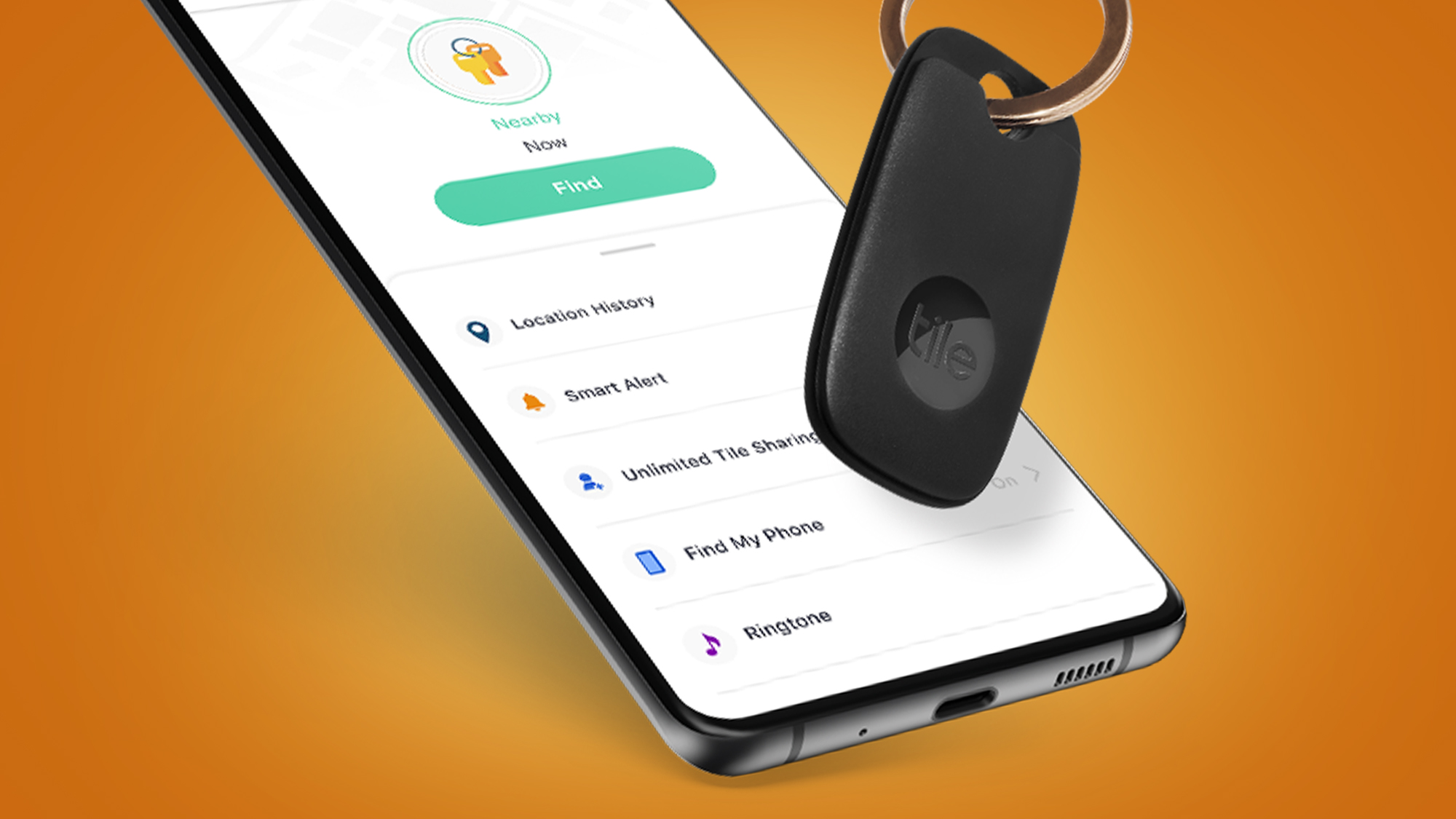
The latter of those is perhaps more exciting than the Google AirTag itself, and Google is already laying the groundwork for this network, having for example rolled out a feature that alerts you to unknown trackers that might be stalking you.
This is important, because the stalking potential of Bluetooth trackers has proven worrying and led to these being controversial objects.
But the potential for these gadgets is even greater, especially as Google plans to make its 'Find My Device network' available to third-party manufacturers too, so you won't be limited just to the Google AirTags if you want to use Google's mighty Android network to find your belongings.
Get daily insight, inspiration and deals in your inbox
Sign up for breaking news, reviews, opinion, top tech deals, and more.
This could make Android-compatible Bluetooth trackers even more capable than Apple AirTags, which can only tap into Apple's smaller network of devices.
Like the sound of a global object-finding network that could save you from losing prized possessions, wherever you are? Here's everything we know so far about the rumored AirTag rival from Google.
Google's Find My Device network could be ready to launch in March according to Mishaal Rahman, and the Google AirTags might not be far behind.
Google AirTags rival release date and price
Google hasn't made any official announcements about its AirTag rivals yet, but some credible rumors from reliable leaker Kuba Wojciechowski on January 16, 2023, suggested that the concept could be announced at Google I/O 2023.
In a detailed breakdown of the AirTag-style tracker, codenamed 'grogu', Wojciechowski suggested that it could then eventually launch at Google's Pixel 8 event, which happened in October.
I don't have any information regarding the release timeframe of the tag, but if I had to guess I'd say Google's gonna announce the technology at Google I/O and then launch it at the annual fall event, alongside new Google Pixel devices.January 16, 2023
In reality, the Google AirTag didn't appear at either of these events, but Wojciechowski wasn't totally wrong, as Google did announce its Find My Device network at I/O 2023, though this too has yet to launch.
Initially planned to launch in summer of 2023, Google subsequently delayed this Find My Device network. This is because Google is waiting for Apple to update iOS, so the two companies can finalize their joint specification for unwanted tracker alerts.
Google had previously suggested this might be ready to go by the end of 2023, but that of course hasn't happened either. However, according to Mishaal Rahman (a leaker and Android expert) the required specification could be finalized on March 16.
Following that, Apple then needs to roll out unwanted tracker alerts based on this specification, and only then will Google likely launch its Find My Device network, but any Google AirTag will probably land either alongside this service or soon after it, so we might not be waiting too much longer for that either.
| Apple AirTag | Tile Pro | Samsung Galaxy SmartTag2 |
| $29 / £35 / AU$49 | $35 / £30 / AU$50 | $30 / £25 / AU$55 |
| Row 2 - Cell 0 | Row 2 - Cell 1 | Row 2 - Cell 2 |
As for pricing, there have been no leaks to give us a hint of how much a Google Bluetooth tracker might cost yet. But we can get an idea from today's options. An Apple AirTag costs $29 / £35 / AU$49, while the Samsung Galaxy SmartTag2 goes for $30 / AU$55 (roughly £25).
Tile's most premium option, meanwhile, costs $34.99/ £29.99 / AU$49.95, though it does also sell the cheaper Tile Mate for $24.99 / £19.99 / AU$34.95. A Google rival to these trackers would likely be in this ballpark, though a burgeoning Android 'Finder Network' could boost competition and drive down prices.
How might Google's Airtag rival work?
There are two components to the recent Google AirTag rumors and announcements. One is that Google is making its own first-party tracker, but the more interesting element is that it will be part of an Android equivalent to Apple's 'Find My' network that's open to third-party manufacturers. This network has now been announced, but not yet launched.
The technology in Google's AirTag-style device (codenamed 'Grogu') is expected to be similar to Apple's.
On January 16, the reliable leaker Kuba Wojciechowski unearthed evidence that the tracker is apparently "in development by the Nest team", and we've since heard that it might carry Nest branding too, with @neil_rahmouni spotting a 'Nest Locator Tag' in Google Fonts.
I never noticed it before, but interestingly there is a Material Icons for a "Nest Locator Tag" in Google Fonts 🤔 pic.twitter.com/a9TdN9iUN8April 29, 2023
Like the AirTags, it appears Google's version will pack both UWB (Ultra-wideband) and Bluetooth Low Energy connectivity, along with an onboard speaker for emitting cries of help from lost gadgets.
That UWB connectivity is the key one for location trackers. The short-range wireless protocol allows phones to pinpoint the whereabouts of connected objects with a much higher degree of accuracy than Bluetooth. Apple calls this 'Precision Finding' on AirTags. The same tech also allows your phone to do things like act as a digital car key on vehicles with supported locks.
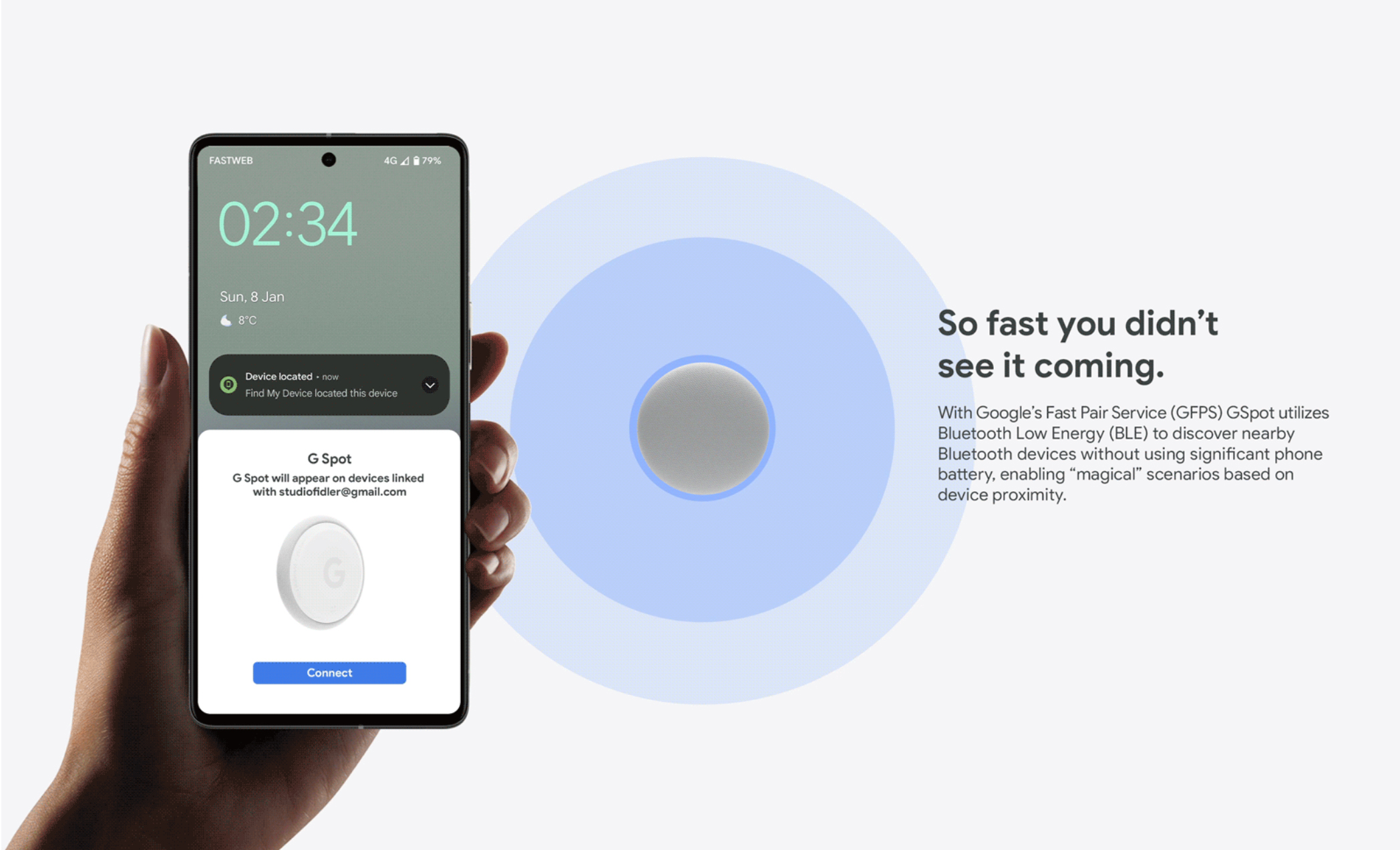
The Google Pixel 6 Pro was the first of Google's phones to support Ultra-wideband, and it's also on the Google Pixel 7 Pro and the Google Pixel 8 Pro. This means you'll likely need one of the best Pixel phones (or Android phones) to use Google's incoming AirTag equivalent. Because the latter rely on UWB, AirTags are only compatible with phones from the iPhone 11 onwards.
Okay, but we've seen lots of Bluetooth trackers that support Ultra-wideband before, right? Well, Google's system could have two important twists. Firstly, as spotted by Android journalist Mishaal Rahman, Google added support for 'locator tags' to its Fast Pair standard. Fast Pair is an existing Android feature that helps you quickly connect to nearby Bluetooth devices using a pop-up menu (like in the mockup above) and is open to third-party devices.
This means the speedy pairing system underpinning Google's tracker network could be open to all compatible trackers, not just Google's AirTag rival. But there's more. Those earlier leaks also revealed that Google is working on its equivalent of Apple's 'Find My' network, which has now been officially revealed by Google as its 'Find My Device' network.
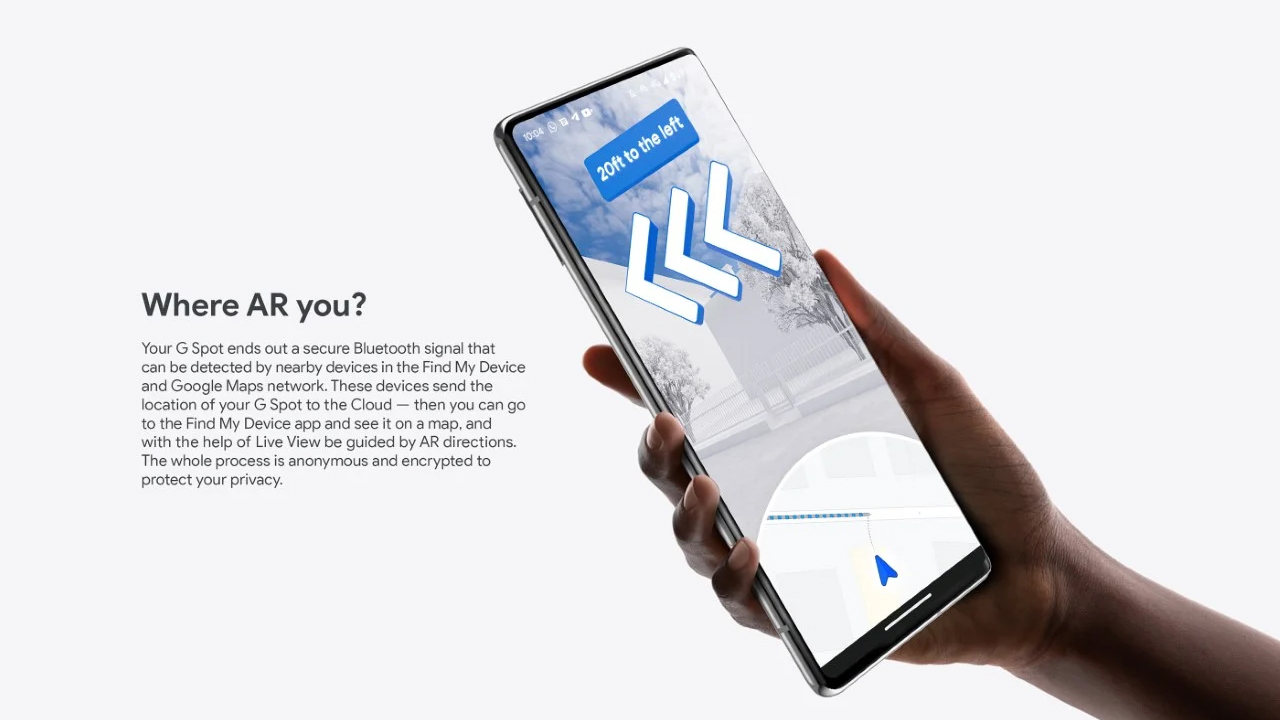
It's this 'Find My Device network' that could be Google's key to making something more than just another AirTag clone. Apple's 'Find My' network anonymously uses the Bluetooth connections of fellow Apple users to look for AirTags (or compatible third-party device) if they're offline or out of Bluetooth range. That's a powerful, invisible trick that's fortunately also end-to-end encrypted.
Apple calls this a "crowdsourced network of hundreds of millions of Apple devices". But Google – with its similar upcoming system – has a bigger army of helpers to track down your lost gadget. At the Google I/O 2022 conference, the company revealed that there are now over three billion active Android devices in the world. That's a lot of potential help when it comes to finding your lost suitcase or camera.
Android already has Google's Find My Device feature, but until recently it was based on your device's most recent known location. Back in December 2022, though, an update meant that it "now supports encrypted last-known-location reports for Android devices, using a new privacy centric framework", and since then an update allowing you to detect unknown trackers that might be used to stalk you has also rolled out.
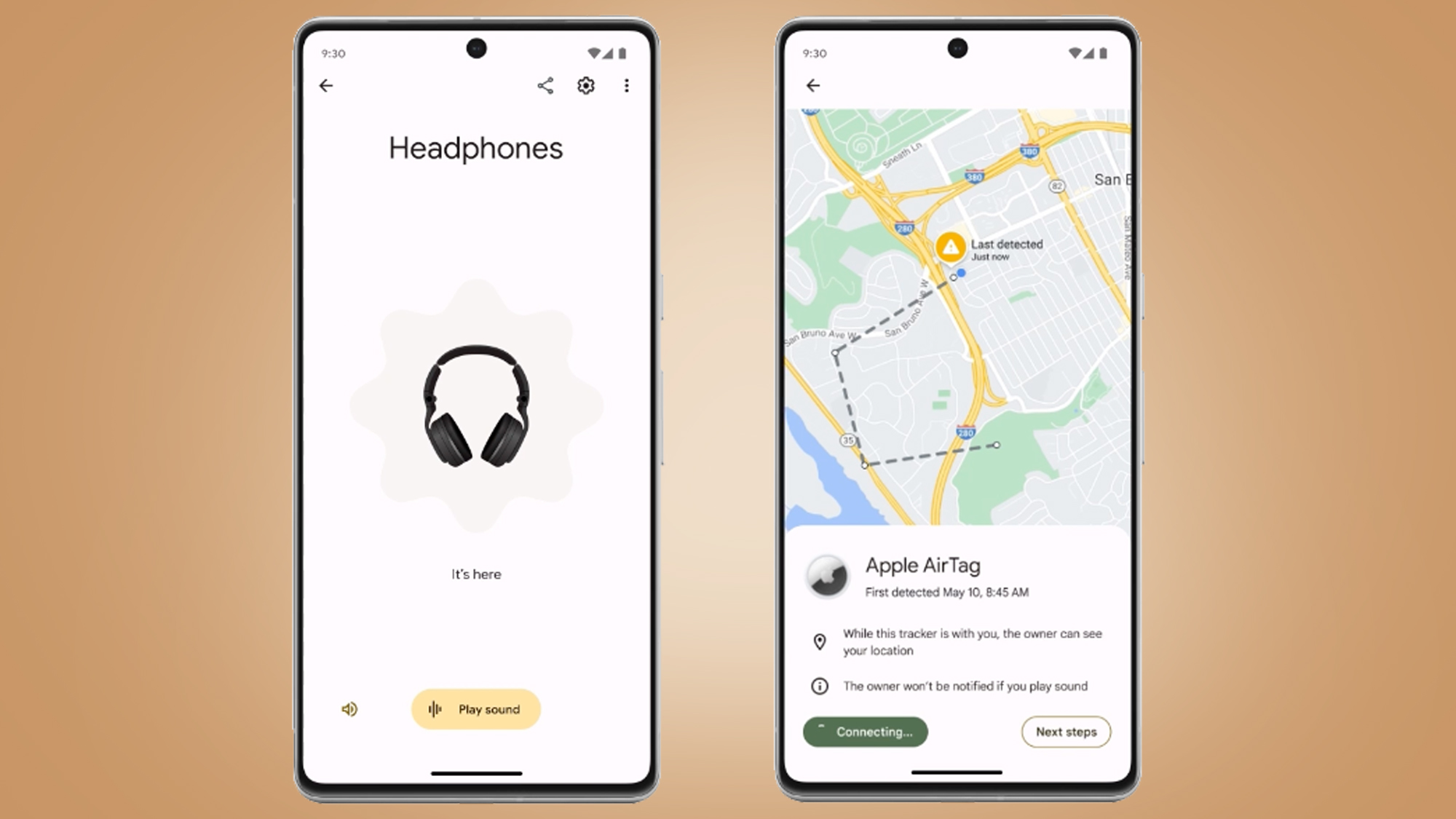
But when the true Find My Device network launches, it will work with Bluetooth trackers – including the Google AirTag if and when that lands, along with third-party trackers. That means you'll be able to track more than just phones. And as with Apple's system this is all encrypted.
Put all of those pieces together and you potentially have the world's most powerful system for finding lost items or possessions, for Android fans at least. Google's own AirTag-style tracker might not be a technological leap over its Apple rival, but the system it's based on could be both more open and bigger than 'Find My'. Who knows, maybe it'll be powerful enough to compel Apple to release that long-rumored AirTag 2.
Early thoughts: why could Google's AirTags be better?
We've previously argued that Google's rumored AirTag rival could be an Android moment for Bluetooth trackers, and the evidence suggests it has the potential to be just that. What's less clear is when the tracker and new 'Find My Device network' might launch.
With the arrival of Ultra-wideband connectivity on recent Google Pixel phones, the pieces are coming together for a launch soon, so we might see both in early 2024, or if not then perhaps at Google I/O 2024 (likely in May).
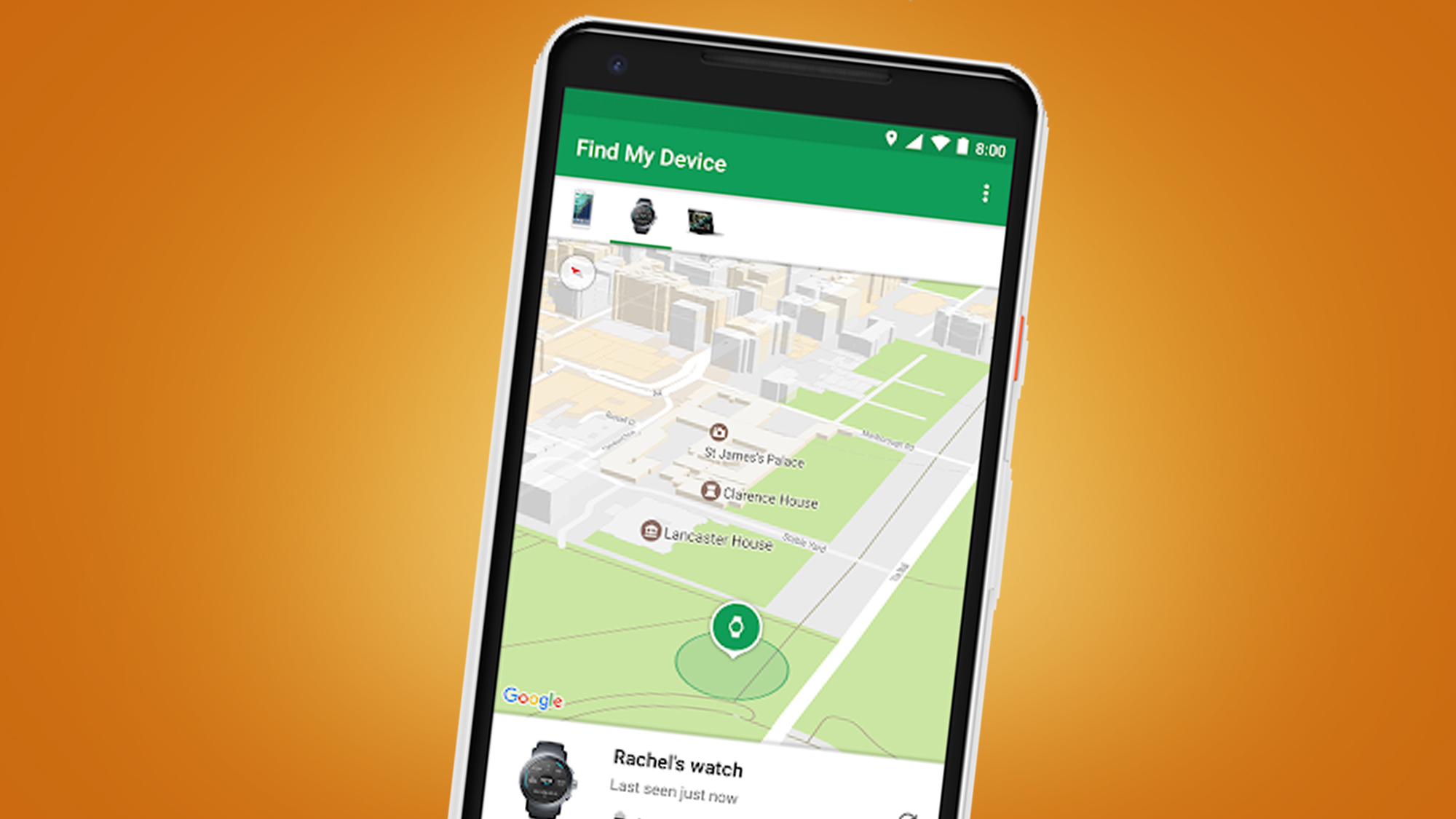
What isn't in doubt is the globe-spanning potential of a Google AirTag with a tracking network that anonymously piggybacks on billions of Android devices. Bluetooth trackers are currently in a fragmented state, with Samsung’s SmartThings Find service only compatible with Galaxy phones and Apple's AirTags being iPhone-only.
Both could be dwarfed by an Android-powered 'Find My Device network', particularly as it's set to be open to third-party manufacturers. So hopefully this service and tracker will both launch soon.

Mark is TechRadar's Senior news editor. Having worked in tech journalism for a ludicrous 17 years, Mark is now attempting to break the world record for the number of camera bags hoarded by one person. He was previously Cameras Editor at both TechRadar and Trusted Reviews, Acting editor on Stuff.tv, as well as Features editor and Reviews editor on Stuff magazine. As a freelancer, he's contributed to titles including The Sunday Times, FourFourTwo and Arena. And in a former life, he also won The Daily Telegraph's Young Sportswriter of the Year. But that was before he discovered the strange joys of getting up at 4am for a photo shoot in London's Square Mile.